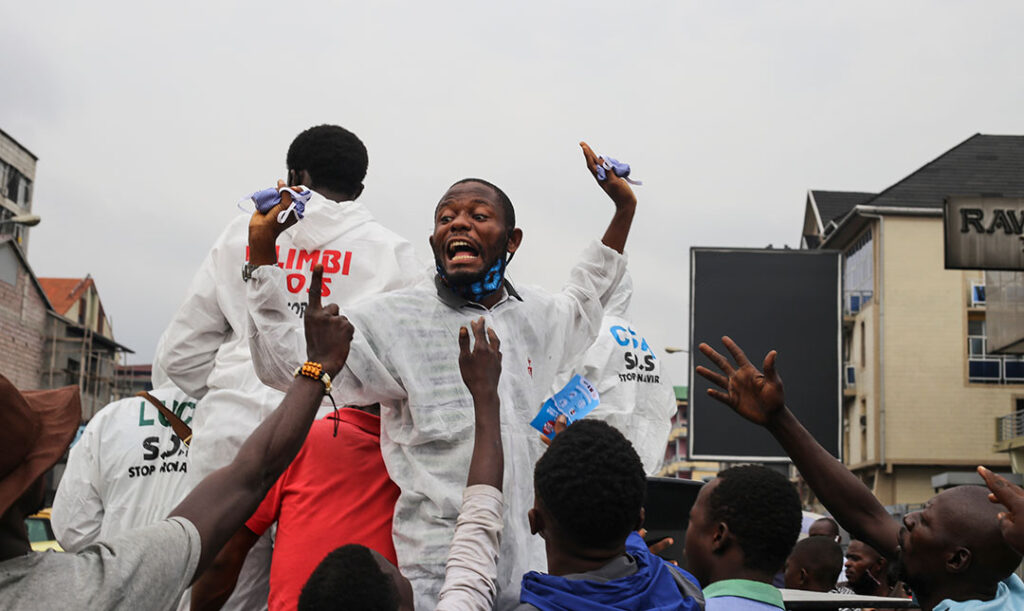ADF STAFF
It’s a familiar sight in the many markets of Kinshasa, the sprawling capital of the Democratic Republic of the Congo (DRC) — young men in white protective gear talking to anyone who will listen, handing out face masks and flyers with information on how to halt the spread of COVID-19.
They are activists with youth organizations such as Lucha and Filimbi, dedicated to promoting democracy and civil society in the DRC.
In their mission to fight the two-headed enemy of an extremely contagious disease and the misinformation that helps it spread, these activists have gone from one outbreak to another.
“COVID-19 is a disease of contact, just that. Without contact, there’s no contamination. Just like Ebola,” Katson Maliro said in a report by U.S. television’s PBS NewsHour. Maliro worked to contain Ebola for the World Health Organization (WHO), bringing information and awareness directly to schoolchildren and people in bustling markets.
“As the number of Ebola cases went down, the community started to have confidence in us. We told them, ‘OK, you followed our preventative measures and now look, the disease is leaving your village.’ That was a huge joy. The fight against Ebola helped the community understand that we could also fight against other diseases, just by washing our hands.”
The DRC had 8,163 recorded cases of COVID-19 and 192 deaths as of July 15, but a significant lack of testing means the official data has little value.
Officials conducted fewer than 5,000 tests in April and May, resulting in skepticism among the DRC population of 84 million.
Rumors abound, as many people refuse to wear masks, socially distance or even believe COVID-19 is in the DRC.
“We do indeed have this disease at home in the DRC,” Minister of Health Eteni Longondo said on Okapi radio. “Let there be no doubt. … I cannot, as the others say, invent cases in the Congo. I am minister of health, and I must protect the health of the Congolese people. The population must not rely on what is said on social networks.”
The country’s first case of COVID-19 provided an unfortunate example of why there is so much public mistrust.
Longondo announced March 10 that the patient was a Belgian citizen who was in Kinshasa for a short visit. One day later the patient was revealed to be a Congolese citizen who was living in France and had arrived in Kinshasa on March 8. The patient also denied being sick.
Reliable health information, initiatives and interventions are extremely difficult due to Congolese distrust of authority.
Its roots stretch to 2016 when President Joseph Kabila was accused by his opposition of delaying the country’s election in order to remain in power. Kabila’s administration canceled the vote in Ebola-stricken provinces, resulting in widespread violence and dozens of protesters killed by police.
More than two years later, in January 2019, the DRC had its first-ever peaceful transition of power since independence when Félix Tshisekedi was sworn in as president.
Tshisekedi took over the country’s Ebola response at the height of public mistrust. Dozens of health care workers had been killed in hundreds of attacks during the DRC’s 10th outbreak. The new president traveled around the country, speaking directly to the people, many of whom in the vast, rural eastern provinces had refused Ebola vaccinations.
“It is not an imaginary disease,” he said to a crowd in the city of Beni after washing his hands and having his temperature taken, according to Reuters. “If we follow the instructions, in two or three months Ebola will be finished.”
Indeed, the Ebola response turned a corner in 2019 when officials expanded efforts to engage with communities. Local activists, youth groups and organization workers educated and empowered people in support of public health initiatives.
Today, there are as many lessons learned from the fight against Ebola that resonate in the response to COVID-19 because there are activist, youth and missionary groups working to educate the public in schoolyards and packed markets.
“Our experience with Ebola has helped a lot,” said Emanuelle Bofoe, who works with a Catholic outreach organization called Caritas. “The actions to stop the spread of COVID-19 are similar to the ones to stop Ebola, but with a greater focus on mask wearing, confinement and social distancing.”

